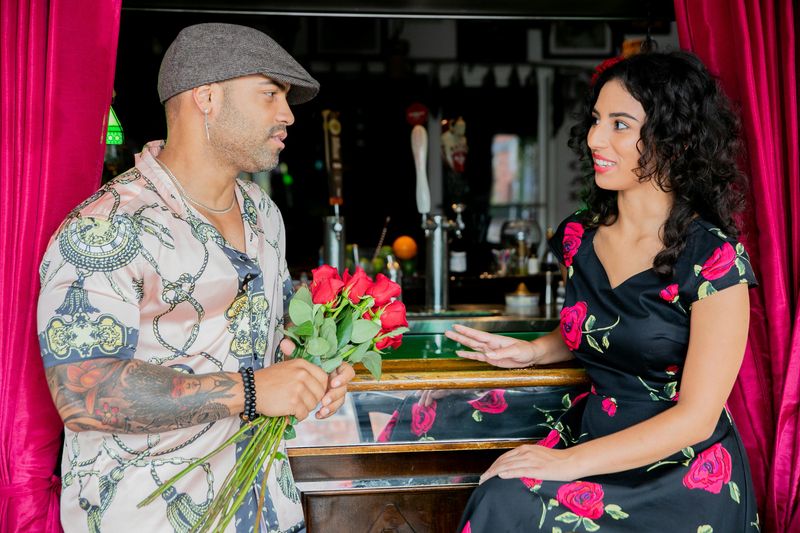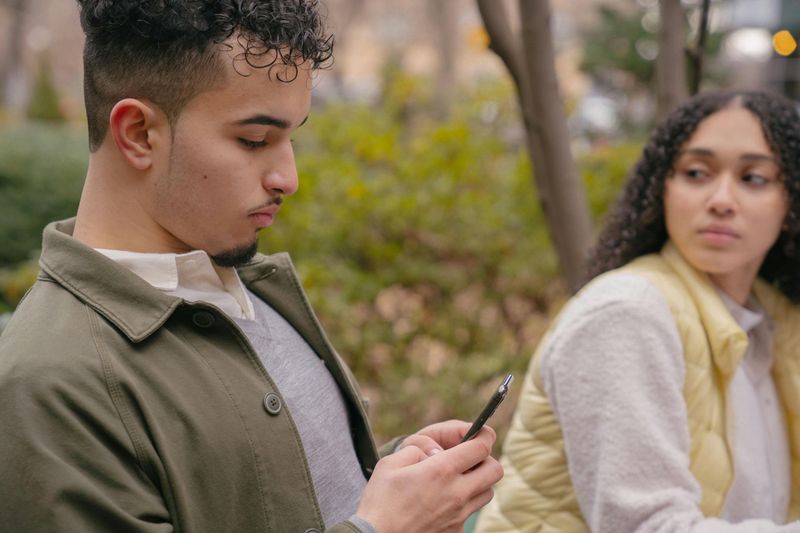10 Potential Relationship Red Flags That Can Surface on a First Date

First dates can be exciting, but they’re also your first chance to spot warning signs before getting too involved. While everyone deserves the benefit of the doubt, certain behaviors might hint at deeper issues that could affect a relationship down the road. Paying attention to these potential red flags early on can save you time, heartache, and help you make smarter choices about who deserves a second date.
Disrespect Toward Service Staff

Watch how your date treats the waiter bringing your food or the barista making your coffee. Someone who snaps their fingers, makes demanding requests, or talks down to service workers is showing you a glimpse of their true character.
This behavior reveals how they might treat people they perceive as ‘beneath’ them. Kind people show respect regardless of someone’s job title or status. If they’re rude to the server but sweet to you, remember that you’re currently getting their ‘best behavior’ treatment.
Many relationship counselors consider this one of the most reliable indicators of a person’s fundamental values. The way they handle minor frustrations with service staff often mirrors how they’ll handle conflicts with you when they’re no longer trying to impress.
Talking Excessively About Themselves

Ever felt trapped in a one-sided conversation? When your date dominates the dialogue with endless stories about their achievements, problems, or opinions without asking about you, pay attention. This isn’t just first-date nervousness—it’s a preview of potential emotional dynamics.
Healthy relationships thrive on mutual curiosity and balanced exchanges. Someone genuinely interested in building a connection will naturally want to learn about you too. They’ll ask questions and actually listen to your answers.
A person who monopolizes conversation might be revealing narcissistic tendencies, insecurity, or simply poor social awareness. Whatever the cause, this pattern rarely improves with time and often worsens once the relationship becomes established and they no longer feel the need to impress you.
Constant Phone Use or Distraction

The phone sits face-up on the table, drawing their eyes every time it lights up. They check notifications mid-sentence, respond to texts while you’re talking, or worse—take calls without apologizing. This digital distraction speaks volumes about their priorities and ability to be present.
When someone can’t disconnect for a couple of hours during a first meeting, they’re demonstrating poor boundaries with technology and disregard for your time and attention. Quality time requires presence—both physical and mental.
Occasional glances might be habit, but constant checking suggests they’re keeping options open or simply lack the self-control to focus on the human in front of them. Either way, this behavior typically escalates in established relationships when the motivation to impress has faded.
Pressuring for Intimacy or Rushing Things

Your date keeps finding reasons to touch you despite your subtle shifts away. Maybe they suggest going back to their place minutes after meeting, or they’re already talking about introducing you to family after one drink. These accelerated timelines aren’t romantic—they’re concerning.
Healthy connections develop at a comfortable pace for both people. Someone pushing for physical closeness when you’re clearly hesitant shows disregard for your boundaries. Similarly, emotional rushing—declaring strong feelings unusually early or mapping out future plans—can signal attachment issues or love bombing tactics.
Trust your instincts when something feels too fast. People with genuine interest respect your comfort level and understand that meaningful connections take time to build. Pressure tactics often reveal someone more interested in fulfilling their immediate needs than building something sustainable.
Speaking Negatively About Past Partners

“My ex was completely crazy” or “All my previous partners were manipulative” might seem like innocent venting, but this pattern deserves your attention. When someone portrays themselves as the perpetual victim in every past relationship, they’re waving a relationship caution flag.
This behavior suggests they might struggle with accountability or lack self-awareness about their role in relationship dynamics. Everyone has an occasional difficult ex, but if every single past relationship ended because the other person was entirely at fault, something doesn’t add up.
Listen carefully to how they frame these stories. Do they show any reflection on their contributions to past breakups? Can they speak about former partners with basic respect despite things not working out? Their ability to discuss past relationships maturely often predicts how they’ll handle future conflicts with you.
Avoiding Direct Answers to Simple Questions

“What do you do for work?” receives a vague “I’m between things right now” without elaboration. Questions about where they live get deflected with jokes. Basic inquiries about family or background lead to subject changes. This pattern of evasiveness should raise your awareness.
While privacy boundaries are normal, consistent dodging of straightforward questions suggests potential dishonesty. Someone with nothing to hide generally provides basic information comfortably. Evasion often masks complicated truths—perhaps they’re in another relationship, misrepresenting their living situation, or hiding aspects of their life.
Notice if they redirect personal questions back to you without ever answering themselves. This technique keeps you talking while revealing nothing about them. Trust develops through gradual, mutual disclosure—if that exchange feels imbalanced from the start, consider why they might be keeping their cards so closely guarded.
Displays of Excessive Jealousy or Possessiveness

“Who’s texting you?” they ask when your phone buzzes, despite having just met you. Or perhaps they make uncomfortable comments about the server who smiled at you or question your friendships with people of the gender you’re attracted to. These early controlling behaviors might seem subtle but deserve serious attention.
Healthy relationships are built on trust and respect for independence. Someone showing possessiveness on a first date is revealing insecurity that will likely intensify as emotional investment grows. What starts as “caring” questions can evolve into monitoring your communications and restricting your relationships.
Particularly concerning is when these behaviors appear before any commitment exists. If they’re already attempting to establish ownership over your attention and relationships during a first meeting, imagine how these tendencies might expand with time and perceived entitlement.
Inconsistent Stories or Contradictions

Something doesn’t quite add up. Early in the evening, they mentioned growing up in Boston, but later referenced childhood in Seattle. They claimed to be passionate about their career but seem vague about basic details of their work. These contradictions aren’t necessarily lies—but they warrant attention.
Memory slip-ups happen to everyone, but patterns of inconsistency often reveal fabrication. People telling the truth don’t need to track which version of events they’ve shared. Listen for contradictions about significant life details like relationship status, living situation, or employment.
Your brain often catches these discrepancies before consciously processing them, creating that uneasy feeling that something’s off. Rather than immediately confronting them, which might lead to more elaborate stories, simply note the inconsistencies. If you decide to pursue another date, pay attention to whether their narrative stabilizes or continues shifting.
Lack of Basic Courtesy or Consideration

They arrived 20 minutes late without texting. Maybe they interrupted you repeatedly or dismissed your opinions with casual arrogance. Perhaps they ordered expensive items and assumed you’d split the bill equally. These seemingly small courtesies reveal significant character insights.
Manners aren’t about rigid etiquette—they demonstrate respect and consideration for others. First dates naturally bring best behaviors, making rudeness particularly revealing. If basic kindness and thoughtfulness aren’t present during this impression-making phase, they likely won’t magically develop later.
Pay special attention to how they handle minor inconveniences. Do they snap at the waiter over a small mistake? Complain excessively about trivial matters? These reactions provide previews of how they’ll respond to the inevitable frustrations that arise in relationships. Remember: you’re witnessing their polished version—everyday behavior is rarely better than first-date behavior.
Alcohol or Substance Overuse

Four drinks in and they’re still ordering more. Maybe they suggested shots right away or seemed anxious until the drinks arrived. While having a beverage to relax is common, excessive consumption on a first meeting deserves your attention.
Heavy drinking during initial encounters might indicate dependence issues, poor self-regulation, or reliance on substances for social comfort. Consider whether they seemed able to enjoy your company without being intoxicated. Did their personality shift dramatically with each drink?
Equally telling is how they react if you decline to match their pace. Do they pressure you to drink more or seem uncomfortable with your sobriety? Someone who respects boundaries will never push substances. Remember that first dates typically showcase restrained behavior—if substance use already seems concerning, it likely represents a minimized version of typical habits.

Comments
Loading…